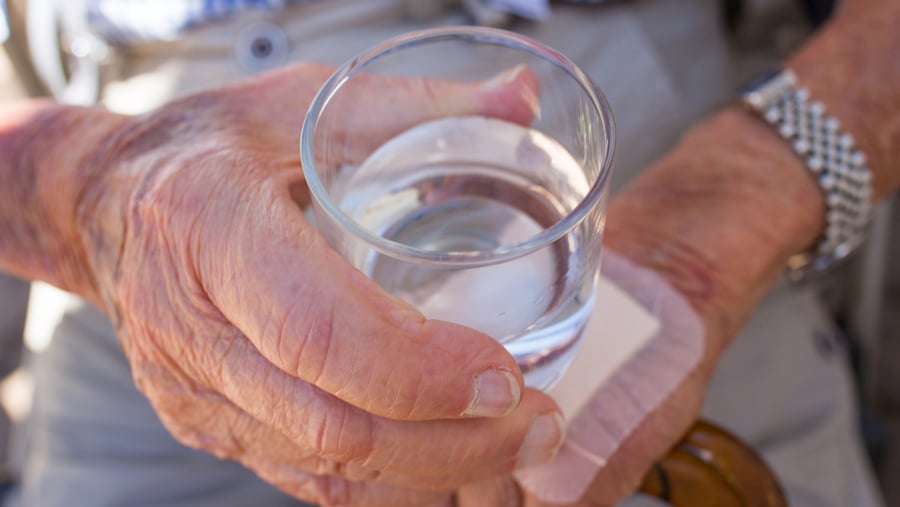Dehydration is not just about the number of glasses of water you drink. It’s also about how much water your body is losing through sweat, urine and stool. You can easily become dehydrated if you don’t replace fluids or have any illness or injury that causes fluid loss through urinating more than usual. The human body is made up of 70 percent water, but our daily activities, environment and diet can wear down that vital fluid. Many people may not be aware of this condition until they feel the negative impact. The effects of dehydration can manifest themselves in a wide range of ways, from constipation to headaches, and even kidney problems. Learn some facts about dehydration in this article below to get better understanding behind this condition.
From the symptoms of dehydration to the bad effects of severe dehydration, those truth facts below will increase your awareness to keep your body hydrated.
Without any further ado, let’s get started!
Table of Contents
- Amazing Facts About Dehydration
- 1. 75% Americans Feel Dehydration
- 2. Dehydration Can Cause Serious Fatigue
- 3. Thirst is A Sign of Dehydration
- 4. Dehydration Causes Focus Loss
- 5. Dehydration Slows Down Metabolism, Leading To Gain Weight
- 6. Dehydration Lead To Kidney Stones
- 7. Dehydration Can Lead To Tachycardia
- 8. Severe Dehydration Can Cause Death
- 9. Dehydration Not Only Caused by Water
- 10. A Person Only Can Live 3 Days Without Water
- 11. Hard Feces Indicate Dehydration
- 12. Dehydration Can Cause Bloating
- 13. Dehydration Affects Sleep Hormone
- 14. Lost of 10% Body Water Already Classified As Dehydration
- 15. Dehydration Cause Skin Problems
Amazing Facts About Dehydration
1. 75% Americans Feel Dehydration

According to CBS, 75% of Americans are chronically dehydrated. Dehydration is widespread in older persons, covering up to 30% of that population. In the United States, it has been claimed that 17 percent to 28 percent of older persons suffer from it.

Although most people understand the importance of drinking water, up to 75% of the American population falls short of the Institute of Medicine’s recommended daily intake of 10 cups.
In medical terminology, the majority of people in the United States are chronically dehydrated.
2. Dehydration Can Cause Serious Fatigue

While many people equate exhaustion with a lack of sleep or sleep disorders, there’s another reason you can be feeling tired: dehydration. As your body attempts to function without enough water, you may feel moments of weariness and low energy.
According to the National Hydration Council, symptoms like exhaustion and fatigue account for roughly 20% of doctor visits, with dehydration accounting for one out of every ten of these visits.
If you’re always weary and sluggish despite obtaining a good night’s sleep, you may need to increase your water consumption.

Moreover, blood volume can decline if your body fluid is not refilled. As a result, the heart has to work harder to give oxygen and nutrients to the skin and muscles.
As dehydration worsens, the body diverts blood away from the skin and into the working muscles, reducing your body’s ability to dissipate heat. Muscle cramps, light-headedness, and weariness arise from the increase in internal heat.
3. Thirst is A Sign of Dehydration

Thirst is usually your brain’s way of telling you that you’re dehydrated from not drinking enough water. Dehydration of just 1 to 2 percent has been found to cause thirst in numerous studies.
Meanwhile, polydipsia or excessive and persistent thirst is a symptom of an underlying illness, such as diabetes.

The lamina terminalis, a highly specialized area of the brain, is in charge of steering many of these thirst responses. These cells can measure the osmolality of the fluid in the ventricle and the amount of sodium present.
4. Dehydration Causes Focus Loss

Dehydration not only affects people physically, according to a recent study. It can also cause cognitive impairment.
According to a recent study from Atlanta’s Georgia Institute of Technology, simply a few hours of vigorous activity in the heat without drinking fluids or eating can have a significant impact on concentration.

In addition, dehydration causes brain cells to diminish in size and mass, a condition that many older people experience after years of being dehydrated. “Brain fog” is a term used to describe a lack of mental clarity.
5. Dehydration Slows Down Metabolism, Leading To Gain Weight

When you’re dehydrated, your body’s metabolism slows down. Your gut health will undoubtedly be harmed if you consume less water. Your body won’t produce enough digestive juices, your metabolism will slow, and you will gain weight.

According to clinical nutritionist, Dr. Lovneet Batra, constipation and irritable bowel movement are both linked to weight gain and can be caused by dehydration. Without enough water, your body cannot efficiently convert carbohydrates into energy, and a lack of liquids will also prevent fat decomposition.
Dehydration, both mild and severe, can also have a significant impact on your glucose levels, which is linked to metabolic health and diseases like diabetes.
6. Dehydration Lead To Kidney Stones

Lack of fluid intake has been linked to stone formation and is by far one of the most common reasons for kidney stone formation.
Reduced diuresis occurs as a result of low fluid consumption, resulting in concentrated urine. This can cause mineral supersaturation, which can contribute to kidney stone formation, according to a journal published by PubMed Central.

To avoid kidney stones, a daily water consumption of 100 ounces is recommended. Avoid colas because they contain phosphoric acid, which can raise your chances of developing kidney stones.
Clear drinks are preferred if you wish to drink soda.
7. Dehydration Can Lead To Tachycardia

Did you know that dehydration can lead to heart problems? Tachycardia is a rapid heart rate problem that swiftly reduces a heart’s efficiency. The average heart rate is 80 to 100 beats per minute.
Tachycardia is defined as a heart rate that surpasses 100 beats per minute for a sustained period of time, according to the 31st edition of “Dorland’s Illustrated Medical Dictionary.”

When you are dehydrated, your blood volume decreases, causing your blood to thicken. Moreover, dehydration can cause blood vessel walls to constrict. This makes it more difficult for your heart to deliver blood to your muscles.
Therefore, your heart rate rises and sometimes causes irregular heartbeat as your heart works harder to pump that blood.
8. Severe Dehydration Can Cause Death

Dehydration happens when your body lacks the necessary amount of water and fluids. Dehydration can be mild, moderate, or severe depending on how much fluid is lost and not restored in your body. Severe dehydration is a medical emergency that can be fatal.

When we are dehydrated, our bodies pull water from other organs, resulting in organ failure and brain atrophy, according to the Adult Hydration book in the National Library of Medicine. When your kidneys are unable to clear excess fluids and waste from your blood, you may develop this potentially fatal condition.
Dehydration is considered one of the most painful and protracted deaths a human can experience.
9. Dehydration Not Only Caused by Water

Hydration is about the balance and enough amount of water and electrolytes. Therefore, dehydration is not always caused by water.
According to Medscape, there are three main types of dehydration: hypotonic, hypertonic, and isotonic. Isotonic is the most prevalent kind in humans.

When water loss is greater than sodium loss, resulting in hypertonic dehydration. If significant salt loss is combined with water loss, the electrolyte concentration drops, resulting in hypotonic dehydration.
Moreover, isotonic dehydration occurs when both water and salt are lost at the same time.
10. A Person Only Can Live 3 Days Without Water

Water is required for practically every process in the human body, hence humans can only exist for a short time without it. Your skin may turn a grayish blue color as a result of a lack of blood flow.
After three to five days without drinking water, your organs, particularly your brain, begin to shut down, which can result in catastrophic effects such as fainting, strokes, and, in extreme situations, death.

In fact, a human can survive for around three weeks without food, but only three to four days without water.
However, some factors, such as how much water a person needs and how they use it, can have an impact. Age is one factor that can affect how much water a person needs.
You might also like:
11. Hard Feces Indicate Dehydration

Constipation can also be caused by a lack of water intake or dehydration. To hydrate the body, the intestines and colon absorb water from the stool, according to a study published in Journal Clinical Nutrition.
Therefore, stools will become hard and lumpy if there is not enough water available.

When the muscle contractions in the colon are also slow or sluggish, the stool passes too slowly through the colon, allowing too much water to be absorbed. Especially when you don’t have enough water in your body, it will cause hard feces.
Therefore, you should increase your water intake and include more fruits and vegetables in your diet.
12. Dehydration Can Cause Bloating

Contrary to popular belief, not drinking enough water might make you feel bloated and swollen. Because dehydration and electrolyte imbalances can delay digestion, drinking plenty of water can potentially lower the incidence of bloating.
Sugar cravings are exacerbated by dehydration, and eating too much sugar typically leads to us overfeeding the nasty bacteria. Overgrowths can impede the metabolism, produce bloating and other unpleasant symptoms.

While it may seem contradictory, drinking water can assist to minimize bloat by flushing out excess sodium from the body, according to research from Gastroenterology and Hepatology Journal.
Before you eat, make sure you drink lots of water. This technique has the same bloat-reducing impact and can also help you avoid overeating.
13. Dehydration Affects Sleep Hormone

Dehydration can make it difficult to sleep, and not getting enough sleep might make you more dehydrated. Melatonin, the sleep hormone, can be affected by dehydration.
Chronic dehydration can lower your levels of critical amino acids, which are required for the production of melatonin, disrupting your circadian rhythm and making it harder to sleep. Therefore, make sure you stay hydrated before bed time to get high quality sleep.

However, drinking water before bed can disrupt your sleep by causing frequent midnight urination. If you’re thirsty before bed, a small glass of water may be helpful in getting you through the night.
14. Lost of 10% Body Water Already Classified As Dehydration

Dehydration can lead to physical and mental impairment, as well as intense thirst. Those symptoms can result from a loss of more than 10% of total body water.
A loss of 15-25% of the body’s water causes death. Mild dehydration causes thirst and overall discomfort, and is usually treated with oral rehydration.

Take in up to 1.5 liters of liquids every hour to rehydrate quickly. More than that will be ineffective because the body can only absorb so much. Some scenarios where rehydrating at this rate is critical such as when in between events throughout a long tournament.
15. Dehydration Cause Skin Problems

Dehydration occurs when a person uses and loses more water than they take in. Dry skin is a typical symptom of dehydration. Patches of rough, scaly, itchy skin may be visible. Neglecting to address dehydrated skin can result in acne breakouts, irritation, dullness, and other issues.

Drinking water is supposed to help prevent acne by keeping the skin hydrated. According to a medical study from Clinical, Cosmetic, and Investigational Dermatology Journal, drinking at least 2-3 liters of water every day will aid in the removal of toxins from the body and skin.
Latest Posts:
- They Filled Plastic Bags With Air Because They Couldn’t Afford Balloons For Their Dad’s Birthday
- Nearly $1,000,000,000 Of Elon Musk’s Doge ‘Savings’ Mysteriously Vanish Overnight
- Bette Midler Celebrates Selling Her Tesla, Calling It A ‘Symbol Of Racism And Greed’
- Judge Orders Donald Trump To Rehire Thousands Of Employees Fired For ‘Poor Performance’ By Him And Elon Musk
- Mom Of 5 Deported To A Country She’s ‘Never Been To And Doesn’t Speak The Language’



